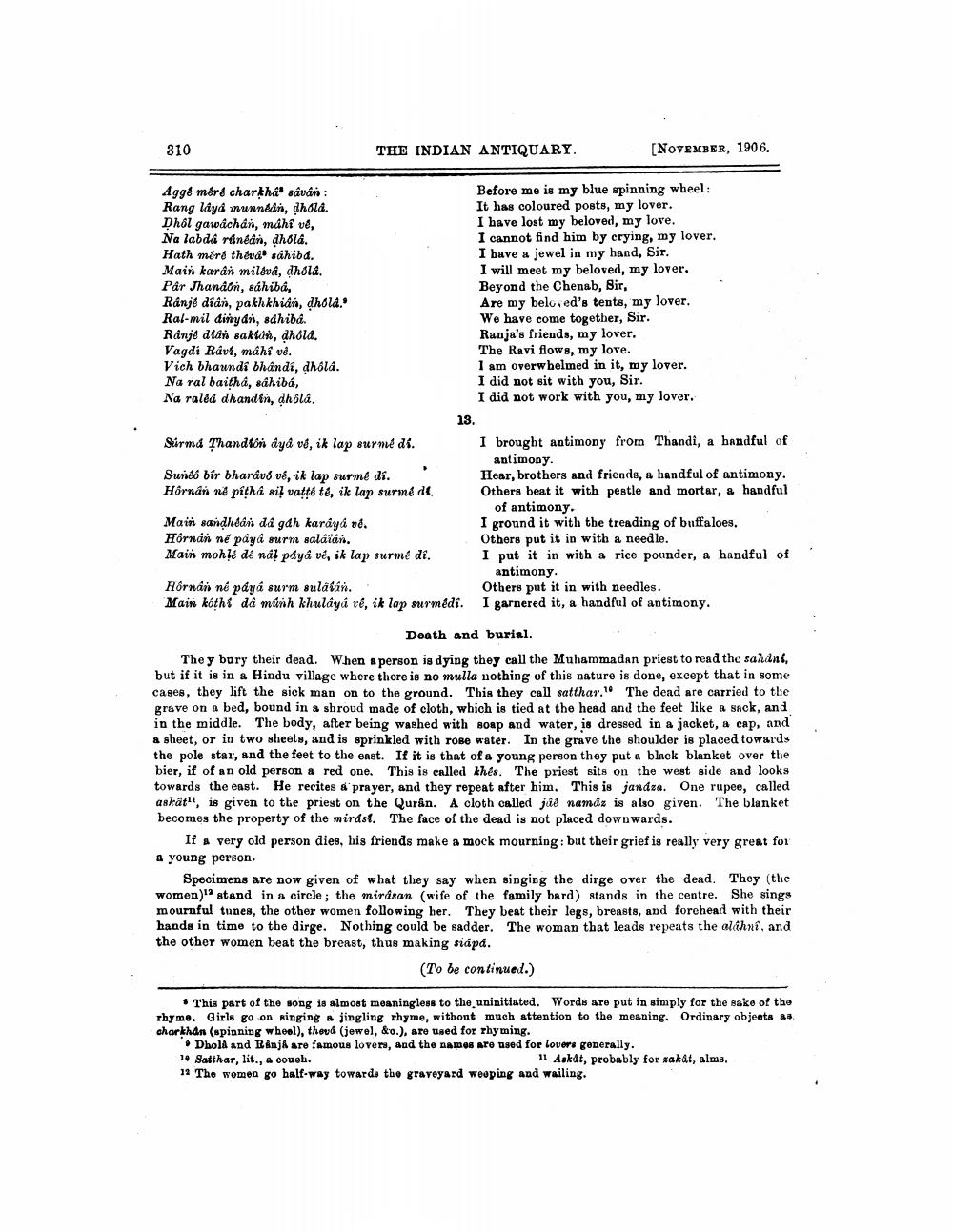________________
310
Aggé méré charkha sâván: Rang lâya munnéân, dhóla. Dhôl gawachán, mâhî vê, Na labdá ránéân, dhola. Hath méré theva sahibd. Main karân milévá, dhóla. Pâr Jhanâon, sahiba, Ránjé díân, pakhkhian, dhold. Ral-mil dinyan, sahiba.
Ranjé dían saktan, dhola.
Vagdi Ravi, mâhî vê.
Vich bhaundi bhandî, dhôlâ.
Na ral baitha, sahibâ,
Na raléd dhandin, dhôlá.
THE INDIAN ANTIQUARY.
Sarma Thandton dyd vé, ik lap surme ds.
Suntó bir bharâvó vé, ik lap surmé dí. Hörnan në pitha sil vatté té, ik lap surmé di
Main sandhéan da gah karaya vé. Hôrnán né pâyâ surm salátán.
Main mohlé dé nál payá vé, ik lap surmê dî.
[NOVEMBER, 1906.
Before me is my blue spinning wheel: It has coloured posts, my lover. I have lost my beloved, my love. I cannot find him by crying, my lover. I have a jewel in my hand, Sir.
I will meet my beloved, my lover.. Beyond the Chenab, Sir, Are my beloved's tents, my lover. We have come together, Sir. Ranja's friends, my lover. The Ravi flows, my love.
I am overwhelmed in it, my lover.
I did not sit with you, Sir.
I did not work with you, my lover.
13.
I brought antimony from Thandi, a handful of antimony.
Hear, brothers and friends, a handful of antimony. Others beat it with pestle and mortar, a handful of antimony.
I ground it with the treading of buffaloes. Others put it in with a needle.
I put it in with a rice pounder, a handful of antimony.
Others put it in with needles.
Hornán né payá surm sulatán. Main kothi da minh khulayá vé, ik lap surmédî. I garnered it, a handful of antimony.
Death and burial.
They bury their dead. When a person is dying they call the Muhammadan priest to read the sahânt, but if it is in a Hindu village where there is no mulla nothing of this nature is done, except that in some cases, they lift the sick man on to the ground. This they call satthar. The dead are carried to the grave on a bed, bound in a shroud made of cloth, which is tied at the head and the feet like a sack, and in the middle. The body, after being washed with soap and water, is dressed in a jacket, a cap, and a sheet, or in two sheets, and is sprinkled with rose water. In the grave the shoulder is placed towards the pole star, and the feet to the east. If it is that of a young person they put a black blanket over the bier, if of an old person a red one. This is called khés. The priest sits on the west side and looks towards the east. He recites a prayer, and they repeat after him. This is jandza. One rupee, called askat, is given to the priest on the Quran. A cloth called ja namaz is also given. The blanket becomes the property of the mirást. The face of the dead is not placed downwards.
If a very old person dies, his friends make a mock mourning: but their grief is really very great for a young person.
Specimens are now given of what they say when singing the dirge over the dead. They (the women) stand in a circle; the mirâsan (wife of the family bard) stands in the centre. She sings mournful tunes, the other women following her. They beat their legs, breasts, and forehead with their hands in time to the dirge. Nothing could be sadder. The woman that leads repeats the alahnî, and the other women beat the breast, thus making siápá.
(To be continued.)
This part of the song is almost meaningless to the uninitiated. Words are put in simply for the sake of the rhyme. Girls go on singing a jingling rhyme, without much attention to the meaning. Ordinary objects as charkhan (spinning wheel), theud (jewel, &o.), are used for rhyming.
Dhola and Ranj& are famous lovers, and the names are used for lovers generally. 10 Satthar, lit., a couch.
12 The women go half-way towards the graveyard weeping and wailing.
11 Askåt, probably for zakat, alms.




